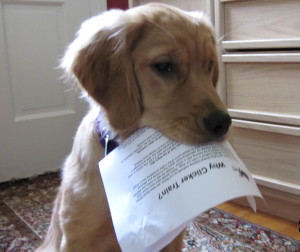
Clicker Training FAQ's
By Lisa Patrona, Dip. CBST, CPDT-KA, ACDBC, AABP-CDT
Clicker training is the most humane and effective method used in dog training. We talk to people everyday who have never heard of it and are hesitant to try it, so here we'll take some time to teach you about clicker training, address some common concerns, and answer some frequently asked questions!
Q: What is clicker training?
A: It's a positive reinforcement-based training method that teaches the dog to repeat behavior/s that make the click happen! The clicker is a training tool that teaches new behavior quickly and effectively, and is a lot of fun for both dog and human! It's simply never, ever necessary to use force, fear, or intimidation in training. Clicker training enhances the bond between you and your dog as you enjoy the training process together!
Q: How does it work and how does it help my dog learn to do what I want?
A: Clicker training works on 2 primary learning principles: Classical (making associations) and operant (behavior = consequence). First, the sound of the clicker is followed immediately and repetitiously with food (click/treat, click/treat, click/treat). This process teaches the dog that the sound of the clicker is significant, and he learns to predict the delivery of a treat when he hears it.
From there, the click sound (because it now predicts the delivery of food!) will serve to positively reinforce behavior and teach your dog to repeat the behavior/s which make the click happen!
Q: Is it more effective than traditional methods?
A: Clicker training provides a positive reinforcement approach to training that is effective, and fun for both you and your dog! A more "traditional" approach involves the use of equipment such as choke, pinch, prong,and shock collars in an attempt to train the dog to engage in behavior - or to avoid behavior - to prevent a painful consequence. Traditional approaches often lead to new or worsening behavioral problems. Clicker training is not only amazingly effective, it's completely safe and fun for both ends of the leash!
Q: Why use a clicker? Can't I just use food by itself to reward my dog?
A: Reinforcement strengthens behavior, but the timing of reinforcement will determine which behavior the dog will choose to repeat! If reinforcement (i.e. a food reward) does not occur as the dog is actually engaged in the target behavior, h/she will not make the connection between the two events. The clicker provides a 'bridge' - sometimes called a 'behavior marker' - between the behavior and the reward for that behavior (as predicted by the click!) which helps the dog make the connection clearly and immediately. They'll learn to repeat behaviors that make the click happen because the click means a treat/reward is coming, creating a fast and effective learning experience for you and your dog. Unless you have the food treat delivered to your dog consistently as the target behavior is happening - which is impossible for most people - you'll need some way to bridge the behavior and the consequence...this is why the clicker is so effective!!
Q: Is clicker training hard to learn?
A: No! It's very simple, and our students agree! All you have to do is develop your timing skills, so you're clicking for behavior you like as it occurs! Timing is critical in dog training, regardless of the method. Clicker students find timing their click properly far easier - and a lot more pleasant! - than trying to properly time punishments or 'corrections' for unwanted behavior!!
Q: Can I use my voice instead of a clicker?
A: You could, but there are a couple of reasons the clicker is more effective than a verbal marker. First,verbal markers (words like, "yes!" or "good!") are commonly used in everyday conversations which can effect their significance to the dog and dampen their effectiveness overall. Second,the word is not likely to sound the same consistently - and even subtle changes in intonation may confuse the dog. The clicker's very distinct and consistent sound makes it easier for the dog.
Q: Do I have to carry the clicker around for the rest of my dog's life?
A: This is the biggest misconception about clicker training and we hear it a lot! The clicker is used to teach and strengthen new behaviors. Once a behavior is learned and put on cue, you'll click for that behavior less often, and eventually not at all. Once your dog is clicker trained, they'll never forget it, so you'll have a tool to use to teach new behaviors (or refresh already-learned behaviors!) for the rest of your dogs life!!
Q: Will my dog confuse other sounds (like the clicking of a keyboard, or other environmental noises) with the clicker sound?
A: Dogs are VERY good discriminators and will easily differentiate between the sound of the clicker, and other sounds.
Q: Isn't it confusing to my dog to have multiple students in class clicking at the same time?
A: You would be surprised how fast dogs learn which click belongs to them!! The "connection" between you and your dog builds quickly and s/he'll realize in no time that the click came from you for his/her behavior!

